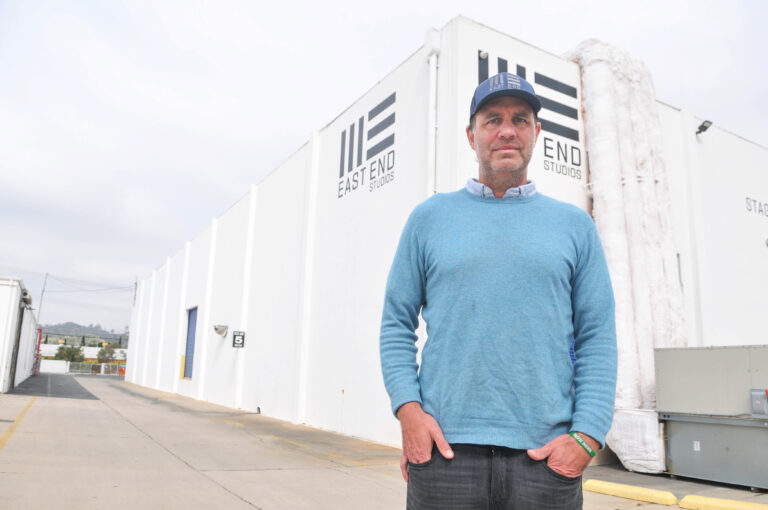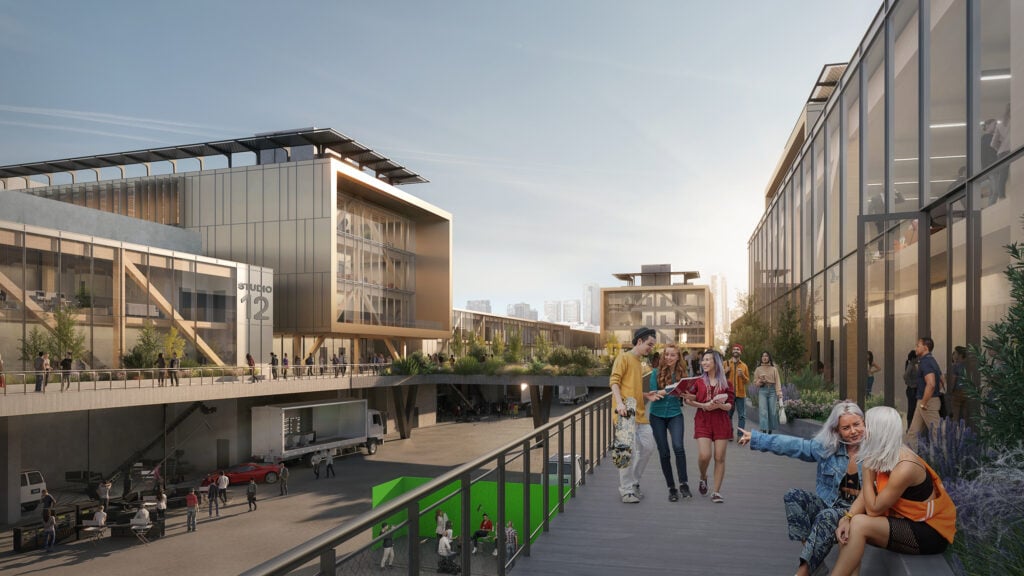
Despite job cuts across the entertainment industry, the development of production facilities is booming in Los Angeles as studios expand existing lots and independent capital firms create more soundstages.
In February, Walt Disney Co. said it would slash 7,000 jobs this year as the studio’s streaming efforts continue to lose money.
Last year, Netflix cut 450 jobs and Warner Bros. Discovery, NBCUniversal and Paramount Global have announced layoffs in recent months.
Yet even as entertainment companies reduce their ranks, massive soundstage projects are under development and construction all over the city. With 6.2 million square feet of soundstages, Los Angeles is the world leader in terms of overall stage space.
Meanwhile, other markets are gaining ground. According to FilmLA, the United Kingdom, which had only 3.5 million square feet of dedicated stage space just three years ago, now comes in second to Los Angeles with 5.4 million square feet. Ontario, Canada, ranks third with 3.8 million square feet followed by Georgia with 3 million, New York with 2.8 million and British Columbia with 2.4 million.
“All of these competitive jurisdictions have plans to expand existing infrastructure,” said a FilmLA report.
The report noted that year-over-year shoot activity was down almost 20% in the fourth quarter of last year and that the film and TV industry is “being impacted by corporate restructuring and impending union negotiations which have caused many productions to pause.” The Writers Guild of America is now in contract negotiations with the Alliance of Motion Picture and Television Producers, and the Directors Guild of America and Screen Actors Guild will soon follow.
“The present slowdown in production notwithstanding, Los Angeles cannot afford to lose its competitive edge when it comes to soundstages and other production infrastructure,” said FilmLA President Paul Audley.
Many existing studio lots are planning expansions. In March, the Murdochs’ Fox Corp. announced a $1.5 billion upgrade of the iconic Fox Studio Lot in Century City, where plans call for nine new soundstages that will bring the total to 24 plus, in addition to high-rise office buildings. Burbank’s historic Warner Bros. Ranch will be redeveloped by Worthe Real Estate Group in a $500 million overhaul that will include 16 new soundstages, a multilevel parking structure, support facilities and a 320,000-square-foot office building. NBCUniversal will be adding eight soundstages as part of an overall update of its century-old Universal Studios lot.
Independent challengers
Hackman Capital Partners, which in 2018 purchased CBS Television City for $750 million, plans to invest $1.25 billion, tripling the lot’s soundstages and adding 1.9 million square feet of studio, office and retail facilities. Hackman Capital also has designs for a $1 billion expansion of the Studio City-based Radford Studio Center, which encompassed 18 soundstages and 210,000 square feet of offices when the Culver City firm purchased the property from ViacomCBS in 2021.
Founded by Mikel Elliott, Quixote Studios, with sites in Pacoima and Sylmar, offered soundstages to productions by such clients as Disney, Warner Bros., HBO, Sony, Paramount and NBCUniversal. At the time of its sale to Hudson Pacific Properties last year for $360 million, it had 325 employees, over 500 cast trailers, trucks and specialized vehicles; one of the industry’s largest inventories of grip and lighting and production equipment; and long-term lease rights to 23 soundstages in Los Angeles and three in New Orleans.

Outside of the Quixote Studios acquisition, Hudson Pacific, in partnership with Blackstone, has acquired Sunset Gower, Sunset Bronson and Sunset Las Palmas studios. It is also building Sunset Glenoaks in Sun Valley, which will see 240,000 square feet on over 10 acres with seven sound stages. The Sunset portfolio includes more than 60 stages across five lots in Los Angeles and the United Kingdom.
Downtown Los Angeles will also see some major studio build-out. New York-based real estate investment firm Atlas Capital Group is redeveloping the building that once housed the Los Angeles Times printing press into a movie and television production lot with 17 soundstages near the Arts District. Atlas bought the 26-acre printing facility for more than $240 million in 2019, and the firm now plans to spend $650 million creating the movie studio. The site will include more than 300,000 square feet of production workspace and 212,300 square feet of offices along with screening theaters, fitness center and a nine-story parking garage. The printing plant itself will be redeveloped into 11 soundstages, production support, executive offices, a full-service restaurant with an outdoor patio, a commissary, café and fitness center. The project will be built in two phases, with the first phase due to be complete next year.
Arts District activity
East End Studios is in the process of developing a production campus in the Arts District at 6th and Alameda streets. The complex will feature 16 soundstages covering 321,520 square feet of studio space as well as 292,310 square feet of creative office space and 106,570 square feet of production support on an approximately 15-acre lot. Vehicular parking will total 1,327 spaces at an underground site. International architecture firm Grimshaw has been hired to design the project.
East End’s project is currently going through slight redesigns and entitlements, aiming to be under construction in the third quarter of next year and completed in 2026.
Shep Wainwright, managing partner of East End Capital, the developer behind East End Studios, said the downtown Los Angeles location at 6th and Alameda was a natural choice for a studio.
“We’ve always been bullish on the Arts District,” Wainwright said. “We have a 5-acre site in Boyle Heights that we’re about to go with vertical construction just across the L.A. River. You already have Apple in the Arts District, Spotify, Warner Music and a number of smaller studios and some other studios that are contemplated. We think for a number of reasons it divides the east and west side of L.A. It’s got great access for trucking. It was historically an industrial neighborhood so it works really well for a studio.”
East End’s Boyle Heights site is a 240,000-square-foot project that will start construction in the next 30 to 45 days.
East End is also developing two sites in Glendale: a 97,000-square-foot project that is under construction on S. Glendale Avenue on a 2.5-acre site, which will accommodate either two or three soundstages.
There is also the 9-acre facility called Griffith on San Fernando Boulevard that will break ground by year’s end and will see 10 soundstages rise.
With all of the soundstages East End is developing, Wainwright does not anticipate any problem filling them up with production.
“The demand in Los Angeles, everything has been running at about 95% occupancy,” Wainwright said. “Anytime a new facility gets delivered, it gets gobbled up either by year-over-year tenants or long-term tenancy. We feel it’s the epicenter of episodic television and we don’t think that’s going anywhere. There’s still a ton of demand for it.”
Peter Hajimihalis, who is based at Jones Lang LaSalle’s downtown Los Angeles office, leases soundstage space for entities such as Hackman Capital Partners and East End Capital.
“In terms of the existing studios that are looking at reinvesting and modernizing, you have years that these studios haven’t had big capital investments made into the lot,” Hajimihalis said. He added that aside from feature films and television series, the studios will generate revenue from other types of product, including commercials and gaming.
“You’ll always have demand in L.A. because of the talent living here and the below-the-line employees,” he said.
The building of studio lots with soundstages is a relatively new phenomenon.
“If you look historically in Los Angeles, purpose-built soundstages haven’t been built over the last 15 or 20 years other than some recent expansions that are just finishing up now,” Hajimihalis said.
Previously, productions had to film in makeshift soundstages.
Meanwhile, developers such as East End’s Wainwright are enjoying the process of providing the industry with soundstages.
“I love development,” Wainwright said. “I love taking something from nothing and turning it into something, regardless of what asset class it is. But (production studios are) an especially exciting one because there’s a whole operational component to it that’s very hands-on.”
